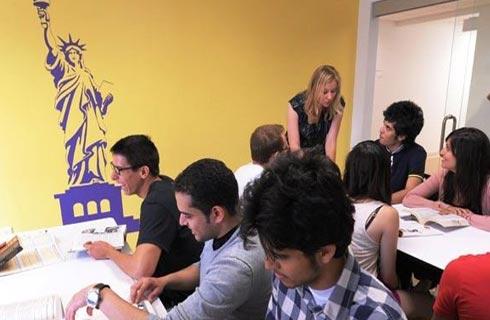社会学,犯罪学和刑事司法学士(联合荣誉)
BA (Hons) Sociology and Criminology and Criminal Justice

学历文凭
Bachelor Degree with Honours

专业院系
School of History, Law and Social Sciences

开学时间

课程时长

课程学费

国际学生入学条件
A Levels: General Studies and Key Skills not normally accepted.
BTEC National Extended Diploma: DMM - DDM
Cambridge Technical Extended Diploma: DMM- DDM
City & Guilds Advanced Technical Extended Diploma (1080): considered on a case-by-case basis
NCFE CACHE Level 3 Extended Diploma: accepted
International Baccalaureate Diploma: accepted
Access: pass required
Welsh Baccalaureate: We will accept this qualification in conjunction with other level 3 qualifications
T Levels: T Levels in a relevant subject considered on a case-by-case basis
Extended Project Qualification: Points can include a relevant Extended Project (EPQ) but must include a minimum 2 full A-levels, or equivalent.
We are happy to accept combinations of the qualifications listed above, as well as alternative Level 3 qualifications such as City & Guilds, Access and Cambridge Technical Diplomas.
We also welcome applications from mature learners.
International Candidates: International Candidates: school leaving qualifications that are equivalent to A levels/Level 3 and/or college diplomas are accepted from countries worldwide (subject to minimum English Language requirements).
IELTS - 6.0 (5.5), TOEFL iBT - 75 overall , (L-17, R-18, S-20, W-18)
IDP—雅思考试联合主办方

雅思考试总分
6.0
了解更多
雅思考试指南
- 雅思总分:6
- 托福网考总分:75
- 托福笔试总分:160
- 其他语言考试:PTE Academic - 56 (51)
CRICOS代码: LM39
申请截止日期: 请与IDP顾问联系以获取详细信息。
课程简介
About This CourseThis joint course gives you the opportunity to explore the complexities of the world we live in through in-depth study of concepts, themes and perspectives relating to Sociology and CriminologyCriminal Justice. You will investigate social life, society and social intuitions, and examine theories and evidence relating to crime, offending behaviour, victimisation, social control, punishment and crime prevention. By understanding the social world, we gain a better understanding of ourselves and our own social situations.<br>Sociology investigates social life and the way it shapes people’s behaviour, beliefs and identity. Its subject matter ranges from an examination of the face-to-face interactions of daily life, to large-scale social institutions, social movements and global processes. By understanding the social world, we gain a better understanding of ourselves and our own social situations.Criminology examines theories and evidence relating to crime, criminals and victims, while Criminal Justice studies explore the various responses to crime, and victims, from informal to formal legislative measures of social control and crime prevention, and examine the way in which the criminal justice system works - from policing through to imprisonment.<br>By combining both areas of academic study students are informed of the key challenges in understanding and controlling criminal behaviour and will be able to locate these matters in the wider perspective of the study of society, and also to better understand the workings of society through the prism of looking at criminology and criminal justice in particular.CareersGraduates on the Sociology and Criminology and Criminal Justice degree have a wide range of career pathways they can explore. Within the criminal justice system there is work in several different areas to consider such as a police officer, prison or probation officer, working in immigration control and youth justice. Like all other social science graduates, students will be able to access a wealth of career options within the policy and social field including public housing, civil service, health service, management, local government administration, education, public relations, and the voluntary sector. Beyond this, though, graduates are appreciated by employers in practically any field of work as specialists for the general: you will have learned to think about anything in a societal perspective. You will have developed your ‘sociological imagination’, a sense for how fellow members of society are likely to see you, themselves and the social world. Many would say this is the most important skill to have in any occupation, as well as in life generally. Students can also go on to study at postgraduate level on one of our many MA courses.
相关申请
 预科
预科 奖学金
奖学金 实习机会
实习机会 在校学习
在校学习 跨境学习
跨境学习 校园授课-线上开始
校园授课-线上开始 在线/远程学习
在线/远程学习
学校排名

世界排名401
数据源:泰晤士高等教育世界大学排名
关于班戈大学

班戈大学自 1884 年建校以来,一直致力于提供世界一流的教学和研究。班戈大学位于北威尔士,地理位置优越,适合希望体验充满活力的生活方式和令人兴奋的户外活动的学生。班戈大学有多种学科课程可供选择。该大学是北威尔士医学院的所在地,新设施有助于培训学生从事医疗行业的各种工作。该校还提供海洋科学等专业科学课程,并拥有自己的研究船--马多格王子号。班戈大学的学生在第一年(9 月入学)可享受住宿保障,并可选择加入 150 多个俱乐部和社团中,结识志趣相投的人,建立牢固的社会纽带,在学习之余享受乐趣。班戈大学卓越的课程设施和热情洋溢的教师团队有助于确保所有学生都能享受到量身定制的丰富学习课程。学生将受益于专业级的资源和学习空间,以及真正关心帮助培养下一代行业领袖的教学人员。斯诺多尼亚国家公园距离班戈大学近在咫尺,可以欣赏到壮丽的景色,可以散步,还可以尝试各种户外运动。在稍远的地方,学生可以乘坐火车方便地到达利物浦和曼彻斯特,以及北威尔士的其他旅游胜地,包括众多美丽的海滩,学生可以在课余时间去探索。
本校相关课程

威尔士历史博士/哲学硕士
学历文凭
Ph.D.
开学日期
课程费用总额


威尔士历史MA / PgDip
学历文凭
Masters Degree (Taught)
开学日期
课程费用总额


翻译研究博士/硕士
学历文凭
Ph.D.
开学日期
课程费用总额


实践翻译研究博士学位
学历文凭
Ph.D.
开学日期
课程费用总额


翻译研究(MA)
学历文凭
Masters Degree (Taught)
开学日期
课程费用总额


MSc Sustainable Tropical Forestry (SUTROFOR) (Erasmus Mundus course)
学历文凭
Masters Degree (Taught)
开学日期
课程费用总额

其他相关课程

考古学(荣誉)文学士学位
 伦敦大学伯贝克学院
伦敦大学伯贝克学院学历文凭
Bachelor Degree with Honours
开学日期
课程费用总额


艺术和创意产业文凭-人类学和社会学(C1AN)
 科廷大学学院
科廷大学学院学历文凭
Diploma
开学日期
课程费用总额


BA History and Politics
伦敦大学亚非学院
学历文凭
Bachelor Degree
开学日期
课程费用总额


荣誉学士学位/ DPS历史和国际关系
 拉夫堡大学
拉夫堡大学学历文凭
Bachelor Degree with Honours
开学日期
课程费用总额


博物馆文化(MA)
 伦敦大学伯贝克学院
伦敦大学伯贝克学院学历文凭
Masters Degree (Taught)
开学日期
课程费用总额


哲学博士(社会科学与公共政策)
 奥克兰理工大学
奥克兰理工大学学历文凭
Ph.D.
开学日期
课程费用总额


























